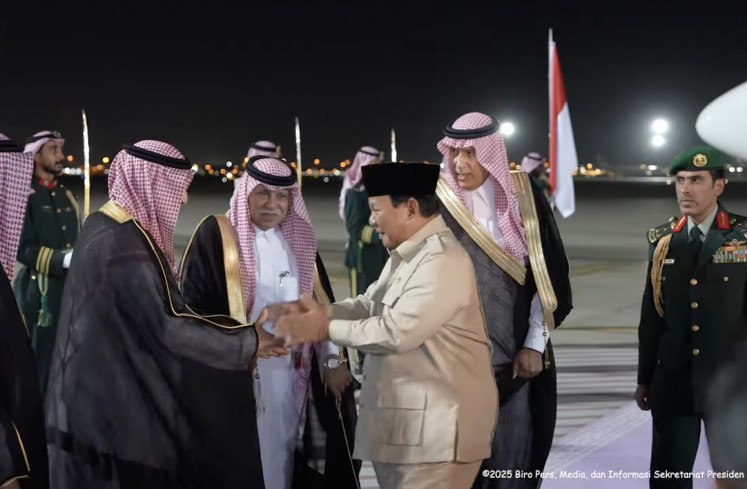Popular Reads
Top Results
Can't find what you're looking for?
View all search resultsPopular Reads
Top Results
Can't find what you're looking for?
View all search resultsIndonesian teen gets global recognition
Highest honor: The International Children’s Peace Prize is awarded each year to youths who have dedicated themselves to championing the rights of other children
Change text size
Gift Premium Articles
to Anyone

H
span class="caption">Highest honor: The International Children’s Peace Prize is awarded each year to youths who have dedicated themselves to championing the rights of other children.
Faye Hasian Simandjuntak, 15, was among the finalists for the International Children’s Peace Prize handed out last month in The Hague, the Netherlands. Past winners have included Nobel Peace Prize laureate Malala Yousafzai.
When Faye Hasian Simandjuntak heard that she was among the three finalists, out of 169 nominees from 55 countries for the International Children’s Peace Prize, she was really surprised.
“I didn’t think I would make it as a finalist,” she said, and for just a moment, Faye sounded like a regular 15-year-old Jakartan teenager. “And it was announced by Desmond Tutu!”
However, Faye is far from being a regular youth. When she was 11, she founded Rumah Faye (Faye’s House), an NGO that rescues and rehabilitates young victims of sex trade.
“It’s so extraordinary that a girl as young as Faye dares to bring forward highly sensitive issues such as prostitution and sex trafficking,” Marc Dullaert, founder of the International Children’s Peace Prize, says in The Hague shortly before the award ceremony.
Faye was nominated for the prize by UNICEF Indonesia.
The other two finalists were Poland’s Tymon Radzik, 16, who fights for the legal rights of minors, and Mohamad Al Jounde, a 16-year-old Syrian boy who had to flee his war-torn country and went on to set up a school at his refugee camp in Lebanon.
Mohamad was announced winner of this year’s Prize, handed over by Malala Yousafzai in the grand, 13th century Knights Hall, the site of major Dutch state functions such as the opening of parliament.
Malala, a tireless fighter for the rights of girls to pursue an education, won the same prize in 2013, a year after she narrowly survived an attempted assassination by the Taliban in her native Pakistan. In 2014, Malala became the youngest Nobel Peace Prize winner in Oslo at the age of 17.
Since 2005, the International Children’s Peace Prize has been awarded each year “to a courageous child who has made an exceptional difference to the rights of the child and the position of vulnerable children, anywhere in the world,” Dullaert explains.
The Prize is organized by the KidsRights Foundation, founded in 2003 by Dullaert, a businessman who shifted gears to supporting the plight of vulnerable children worldwide.
Around the time he started KidsRights, he came up with the idea of setting up an international peace prize for children.
He also found out that the Oslo Nobel Peace Prize had a statute in place that prevented children from receiving the award. However, Dullaert persisted and managed to hold a 10-minute meeting with former Soviet Union leader Mikhail Gorbachev in the corridors of the annual gathering of Nobel Peace Prize winners in Moscow
“The beginning of the meeting was a bit awkward, and it didnt help that we were speaking through translators. Nevertheless, it turned out that we both agreed that there is so much that we can learn from our children,” Dullaert recalls.

On the same day, Gorbachev agreed to go along with plans to set up the International Children’s Peace Prize.
The Prize has recognized children from diverse countries, origins and causes. Winners include Abraham Keita, who combats violence against children in Liberia; Kesz Valdez, who grew up in abject poverty and set up an organization for street children in the Philippines; and Chaeli Mycroft from South Africa, who comes up for the rights of children with disabilities.
The 2016 Prize went to Kehkashan Basu, an environmental activist from the United Arab Emirates.
Speaking at the recent ceremony, Malala Yousafzai said that winning the prize has meant that “I was not alone in my mission. There were people who were standing with me and supporting me.”
She also said that the €100,000 (US$122,030) that came with the prize has helped “30 orphans and 60 girls in their education.”
“Now, the girls are going to university and are able to achieve their dreams.”
Indonesian Ambassador to the Netherlands I Gusti Agung Wesaka Puja also attended the awards ceremony, which was covered by the world press, from Saudi Arabian broadcasters to the Washington Post.
Puja praises Faye “for her courage to focus on internationally relevant issues such as sex trafficking.”
He underlines that this recognition shows that “Indonesian teenagers are doing much more than just wandering in malls or looking at their gadgets. Our hope, of course, is that many more Fayes will come forward in Indonesia.”
Faye, speaking by telephone from Jakarta, expresses hope that Rumah Faye could expand their activities in the near future, including more prevention efforts.
“It would be great if we could also get more volunteers involved, especially youth volunteers. Often, teenagers are not aware that they can serve their communities in so many ways. It’s really not that difficult to volunteer,” she says. “Were in the 21st century, and we have no excuse to say that we can’t do anything.”
She points out that there is enough time in a day to combine all her activities.
“My first priority is school, and then comes Rumah Faye. And believe me: I can still hang out with my friends.”
— Photos courtesy of KidsRights Foundation.









